Hoard and horde: spelling tips to remember the difference
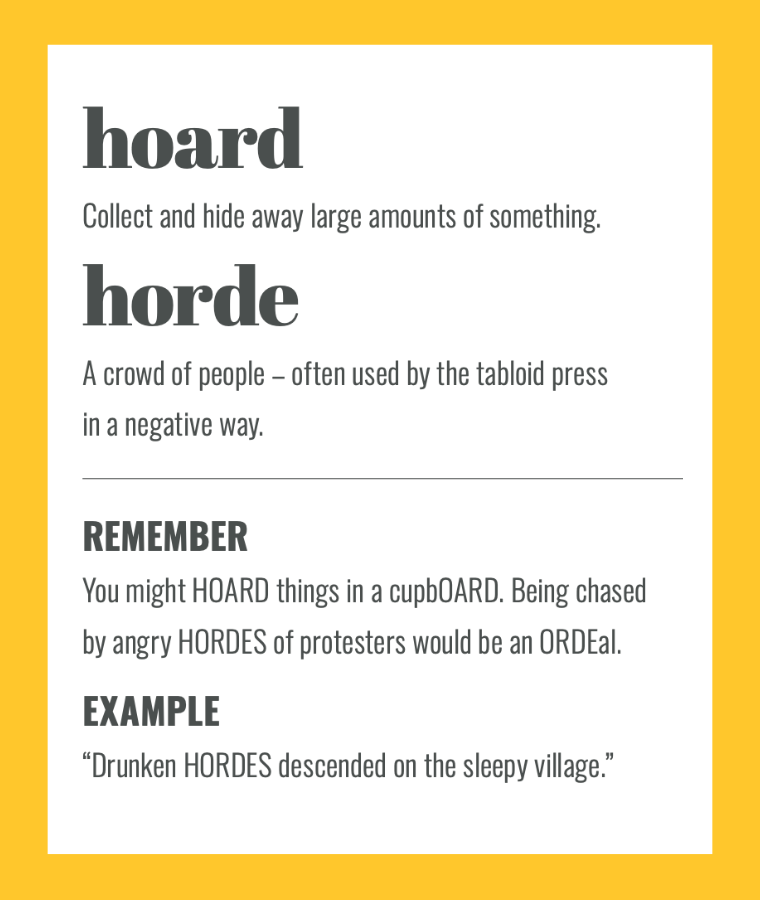
HOARD and HORDE: which is which? Learn the difference between these identical-sounding words.
HOARD and HORDE are easy to confuse. The fact that the two words sound the same – they’re homophones – means people commonly mix them up.
Here, I outline the difference between HOARD and HORDE.
When to use hoard
HOARD is a verb meaning to never throw anything away.
For example:
“I love to hoard old magazines.”
When to use horde
HORDE is a noun, meaning a crowd of people. It’s often used by the tabloid press in a negative way. It’s a little tenuous, but you can use this knowledge to remember which spelling you need, if you think of the word ordeal:
For example:
“She was chased out of the building by a horde of angry people. It was quite an ordeal.”
Want more writing tips?
For more language love, join my Clever Copy Club and get monthly updates direct to your inbox. Alternatively, email me, follow me on Twitter, connect on LinkedIn or like my page on Facebook.
Get more tips in The Little Book of Confusables
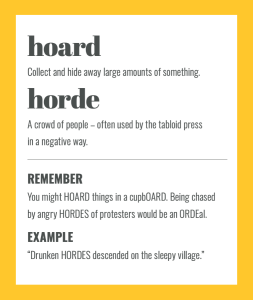
HOARD vs HORDE. Excerpt from The Little Book of Confusables by Sarah Townsend.
Marinate vs marinade: simple tips to help you remember
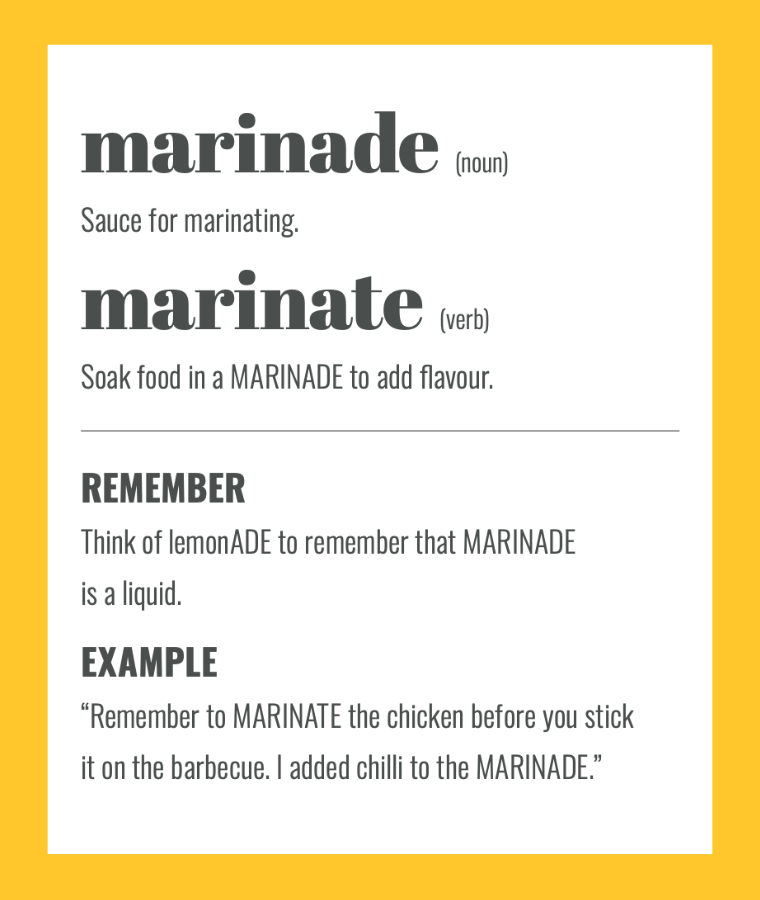
MARINATE vs MARINADE – simple tips to remember the difference
MARINATE and MARINADE are easy to confuse. They may sound similar but they have different meanings. These simple tips will help you decide which word you need.
Marinate
MARINATE is a verb, meaning to soak food in a MARINADE to give it flavour and richness.
“Remember to marinate the chicken before you stick it on the barbecue!”
Marinade
MARINADE is a noun. It’s the sauce or liquid in which a dish is MARINATED, to provide flavour.
“Have you added chillis to the marinade?”
If you find it tricky to remember the difference, think of lemonADE to remember that marinADE is a liquid.
I hope this helps you to remember the difference between MARINATE and MARINADE.
Want more writing tips?
For more language love, join my Clever Copy Club and get monthly updates direct to your inbox. Alternatively, email me, follow me on Twitter, connect on LinkedIn or like my page on Facebook.
Get more tips in The Little Book of Confusables
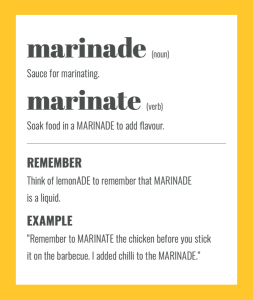
MARINATE vs MARINADE. Excerpt from The Little Book of Confusables by Sarah Townsend.
Principal vs principle: do you know the difference?

PRINCIPAL or PRINCIPLE: which is which? Simple spelling tips to help you remember the difference.
PRINCIPAL or PRINCIPLE – two words with very different meanings. What do they mean – and how do you decide which spelling you need? It’s easy.
These spelling tips will help you decide whether you need to write PRINCIPAL or PRINCIPLE.
Principal
PRINCIPAL is a noun, meaning the head of a school or college, or the most important person within an organisation.
The easiest way to learn this is to remember that PAL is a noun: your PAL the princiPAL.
For example:
“Ms George is the college principal.”
Spelled this way, PRINCIPAL is also an adjective, meaning the chief or most important.
“Increasing turnover is our principal goal.”
Remember the A in principAl and the A in mAin.
Principle
PRINCIPLE is also a noun that describes a fundamental truth or belief.
For example:
“These are the principles of good grammar.”
OR
“I don’t agree with his principles.”
I hope this helps you to remember the difference between PRINCIPAL and PRINCIPLE.
Want more writing tips?
For more language love, join my Clever Copy Club and get monthly updates direct to your inbox. Alternatively, email me, follow me on Twitter, connect on LinkedIn or like my page on Facebook.
Get more tips in The Little Book of Confusables
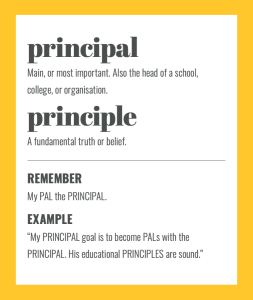
PRINCIPAL vs PRINCIPLE. Excerpt from The Little Book of Confusables by Sarah Townsend.
Lets vs let’s: simple tips to remember the difference

Do you know when the word LETS needs an apostrophe and when it doesn’t? Let’s take a look at the difference (see what I did there?).
When to use LETS without an apostrophe
LETS and LET’S both have the same root word: LET, which means allow, or permit.
Without the apostrophe, LETS is the third-person singular present tense form of the verb LET.
Use it in sentences where LETS can be replaced with either ALLOWS or PERMITS.
For example:
The key LETS you unlock the door.
The app LETS you meet new people.
When to use LET’S with an apostrophe
LET’S with an apostrophe is a contraction of two words: LET and US.
Use it when you’re encouraging someone to do something.
For example:
LET’S go to the pub.
LET’S buy a drink.
LET’S do it.
LET’S go!
Of course, if you want to sound more formal, you might prefer to use LET US.
LET US go to the park.
Worth knowing…
The word LETS can also be used in a property sense (real estate, if you’re using American English) to describe a rented property.
For example:
The agent handles a number of property LETS in the local area.
Get more tips in The Little Book of Confusables

LETS vs LET’S. Excerpt from The Little Book of Confusables by Sarah Townsend.
Imply or infer: do you know the difference?
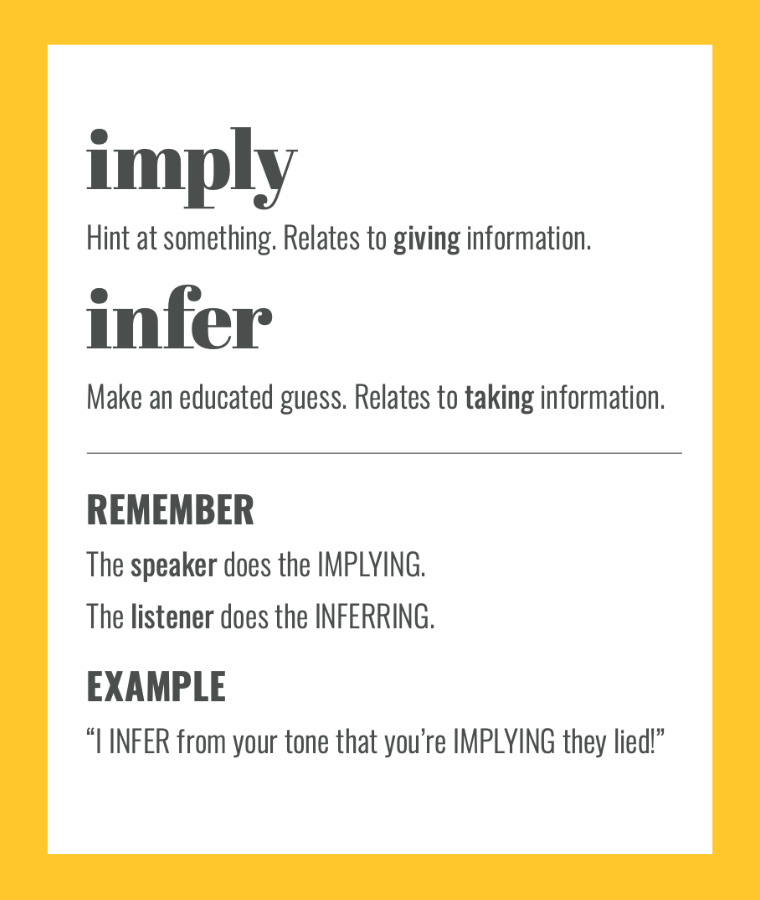
IMPLY and INFER are easy to confuse – especially if you’re new to the English language. But these two words are actually opposites.
Here’s a simple tip to remember the difference between IMPLY and INFER.
When to use IMPLY
IMPLY is a verb that means to hint at something.
IMPLYING is done by the speaker. It relates to giving information.
“Are you IMPLYING that I lied?”
When to use INFER
INFER is a verb that means to make an educated guess from the information presented to you.
INFERRING is done by the listener. It relates to taking information.
“From what you’ve said, I INFER that it wasn’t the first time this had happened?”
Get more tips in The Little Book of Confusables
Fun, memorable spelling and usage tips for 600 commonly confused words, packed into 300+ gorgeous pages for just £11.95. You’ll wonder how you managed without it!
2023 GOLD award winner at the eLit book awards!
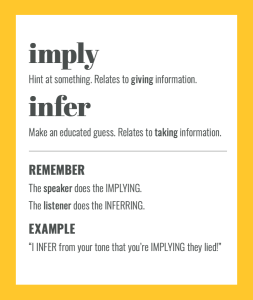
IMPLY or INFER. Excerpt from The Little Book of Confusables by Sarah Townsend.











